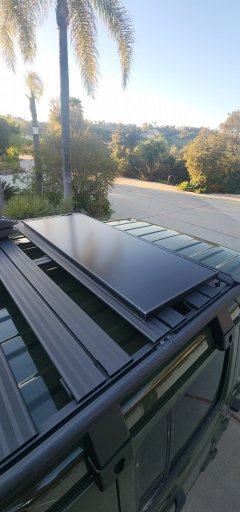
Enthusiast II
I'm getting an Ursa Minor J30 camper top installed on my 2019 JLU in a week. They will install a 200w Renogy solar panel on top, along with a Victron controller. I also have a Jackery 1000 power station that I'd like to integrate into my system, so I can reliably power my fridge and other devices from this rather than directly from the car battery.
In terms of wiring everything together, it sounds like Ursa Minor is flexible, depending on my preferences. Since I don't know much about best practices for solar systems, I was wondering if folks here might have some advice.
I can think of two main options:
1) Renogy/Victron wired directly to the car battery. Jackery charges via the car's 12v outlet.
Pros:
- Since the Ursa Minor tent's lights and USB ports draw power directly from the car battery, keeping this charged is attractive. (But I assume that power draw is pretty minimal.)
- When driving, the Jackery can also charge using power generated by the car's alternator (e.g. on cloudy days). But of course even with the other wiring setup, I could always plug it in to the 12v outlet when needed, so it's not a major advantage.
- Feels like a simpler setup overall. E.g. on shorter trips, I might even be able to leave the Jackery at home and still be able to charge the car battery and use it to power the fridge.
Cons:
- Likely much less efficient (and slower) to charge the Jackery via 12v than directly via solar.
2) Renogy/Victron wired directly to the Jackery, not the car battery.
Pros:
- Likely much more efficient (and faster) to charge than via 12v.
Cons:
- The solar system is useless if I don't bring the Jackery
- Tent lights and USB ports can potentially deplete the car battery if the car remains stationary for several days.
Do my assumptions sound right? Any other things I should consider? What would you do?
Or is there perhaps another option:
3) Install some sort of switch that controls whether the Victron charges the car battery or the Jackery
I.e. best of both worlds?
In terms of wiring everything together, it sounds like Ursa Minor is flexible, depending on my preferences. Since I don't know much about best practices for solar systems, I was wondering if folks here might have some advice.
I can think of two main options:
1) Renogy/Victron wired directly to the car battery. Jackery charges via the car's 12v outlet.
Pros:
- Since the Ursa Minor tent's lights and USB ports draw power directly from the car battery, keeping this charged is attractive. (But I assume that power draw is pretty minimal.)
- When driving, the Jackery can also charge using power generated by the car's alternator (e.g. on cloudy days). But of course even with the other wiring setup, I could always plug it in to the 12v outlet when needed, so it's not a major advantage.
- Feels like a simpler setup overall. E.g. on shorter trips, I might even be able to leave the Jackery at home and still be able to charge the car battery and use it to power the fridge.
Cons:
- Likely much less efficient (and slower) to charge the Jackery via 12v than directly via solar.
2) Renogy/Victron wired directly to the Jackery, not the car battery.
Pros:
- Likely much more efficient (and faster) to charge than via 12v.
Cons:
- The solar system is useless if I don't bring the Jackery
- Tent lights and USB ports can potentially deplete the car battery if the car remains stationary for several days.
Do my assumptions sound right? Any other things I should consider? What would you do?
Or is there perhaps another option:
3) Install some sort of switch that controls whether the Victron charges the car battery or the Jackery
I.e. best of both worlds?



